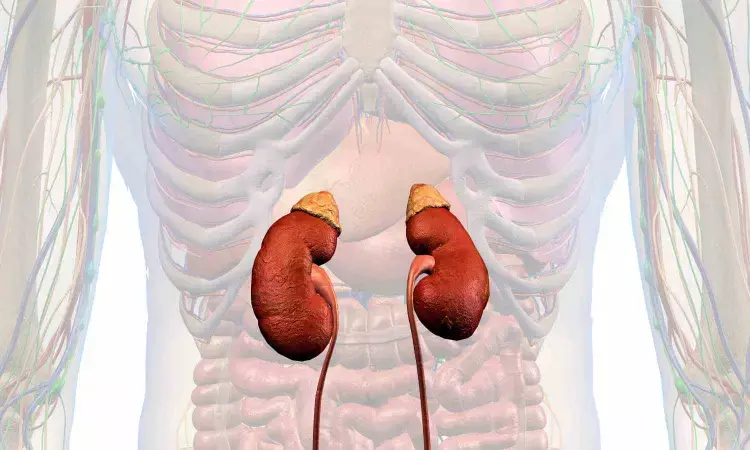- Home
- Medical news & Guidelines
- Anesthesiology
- Cardiology and CTVS
- Critical Care
- Dentistry
- Dermatology
- Diabetes and Endocrinology
- ENT
- Gastroenterology
- Medicine
- Nephrology
- Neurology
- Obstretics-Gynaecology
- Oncology
- Ophthalmology
- Orthopaedics
- Pediatrics-Neonatology
- Psychiatry
- Pulmonology
- Radiology
- Surgery
- Urology
- Laboratory Medicine
- Diet
- Nursing
- Paramedical
- Physiotherapy
- Health news
- Fact Check
- Bone Health Fact Check
- Brain Health Fact Check
- Cancer Related Fact Check
- Child Care Fact Check
- Dental and oral health fact check
- Diabetes and metabolic health fact check
- Diet and Nutrition Fact Check
- Eye and ENT Care Fact Check
- Fitness fact check
- Gut health fact check
- Heart health fact check
- Kidney health fact check
- Medical education fact check
- Men's health fact check
- Respiratory fact check
- Skin and hair care fact check
- Vaccine and Immunization fact check
- Women's health fact check
- AYUSH
- State News
- Andaman and Nicobar Islands
- Andhra Pradesh
- Arunachal Pradesh
- Assam
- Bihar
- Chandigarh
- Chattisgarh
- Dadra and Nagar Haveli
- Daman and Diu
- Delhi
- Goa
- Gujarat
- Haryana
- Himachal Pradesh
- Jammu & Kashmir
- Jharkhand
- Karnataka
- Kerala
- Ladakh
- Lakshadweep
- Madhya Pradesh
- Maharashtra
- Manipur
- Meghalaya
- Mizoram
- Nagaland
- Odisha
- Puducherry
- Punjab
- Rajasthan
- Sikkim
- Tamil Nadu
- Telangana
- Tripura
- Uttar Pradesh
- Uttrakhand
- West Bengal
- Medical Education
- Industry
New drug could help those with congenital adrenal hyperplasia reduce use of corticosteroids: NEJM

People born with the common form of congenital adrenal hyperplasia lack an enzyme in the adrenal glands needed to make the hormones cortisol and aldorsterone, which are involved in the body’s response to stress and blood pressure regulation.
The adrenals of children with this rare condition reroute hormone production to excess androgens, which tend to make them mature early and suffer from short stature and infertility as adults.
To make matters worse, a routine stomach virus can send CAH patients into what is known as an adrenal crisis, causing shock if not treated immediately.
The go-to therapy for children and adults with CAH are high dose corticosteroids, which come with a host of side effects, including weight gain, diabetes, osteoporosis and cognitive dysfunction.
A study, led by Richard Auchus, M.D., Ph.D., of the U-M Medical School Department of Pharmacology and internal medicine and investigators from the CAHtalyst Adult Trial provides strong evidence for an effective compound, crinecerfont, that could allow people with CAH to reduce their dose of replacement corticosteroids.
Published in the New England Journal of Medicine, the study randomized adults with CAH to take crinecerfont or a placebo along with their normal corticosteroid regimen.
A parallel study was conducted in children with CAH, and a companion paper reported these results.
After a month, patients on the drug, but not placebo, had a reduction in the adrenal androgen, androstenedione, by half.
For the second part of the study, each group had their dose of glucocorticoid gradually reduced.
The group on crinecerfont was able to maintain a reduction in the adrenal hormone after 24 weeks with a glucocorticoid dose close to that naturally produced by the body.
“These patients are still cortisol deficient and thus will still need cortisol replacement, but with crinecerfont, they need much less and could be less likely to experience the longterm negative effects of current glucocorticoid dosing,” said Auchus.
Reference:
Richard J. Auchus, Oksana Hamidi, D.O., Rosario Pivonello, Irina Bancos, Gianni Russo, Selma F. Witchel, Andrea M. Isidori, Phase 3 Trial of Crinecerfont in Adult Congenital Adrenal Hyperplasia, New England Journal of Medicine, DOI: 10.1056/NEJMoa2404656.
Dr Kamal Kant Kohli-MBBS, DTCD- a chest specialist with more than 30 years of practice and a flair for writing clinical articles, Dr Kamal Kant Kohli joined Medical Dialogues as a Chief Editor of Medical News. Besides writing articles, as an editor, he proofreads and verifies all the medical content published on Medical Dialogues including those coming from journals, studies,medical conferences,guidelines etc. Email: drkohli@medicaldialogues.in. Contact no. 011-43720751


